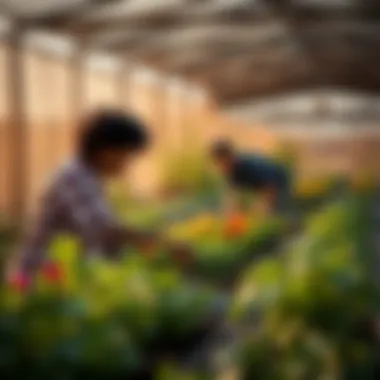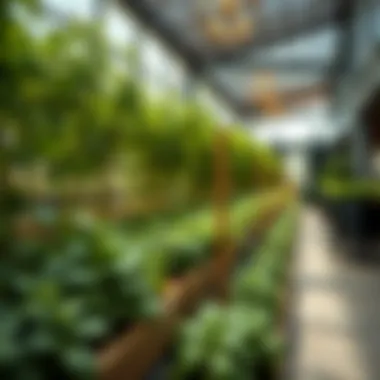Exploring the Role of Farm Gardens in Emaar Properties


Intro
The rise of farm gardens in urban landscapes like Emaar Properties marks a significant shift in how we perceive sustainable living. A blend of nature and architecture, these farms are not just patches of greenery; they embody a philosophy aimed at reconnecting city dwellers with the earth. In places where high-rises dominate the skyline, cultivating a garden offers a breath of fresh air—not only for the landscape but also for the community.
As we explore this topic, it's crucial to highlight the importance of farm gardens within Emaar Properties, reflecting broader societal trends. The presence of such gardens highlights a growing awareness of ecological sustainability and wellness, offering unique insights for investors and stakeholders keen on capitalizing on Dubai's property market. Residents get to enjoy fresh produce right at their doorstep, while at the same time, this initiative fosters a sense of community and responsibility towards the environment.
Through this article, we will delve into market analyses, investment strategies, and examine the intrinsic value these gardens bring to urban living. The narrative will not only captivate interested minds but also provide a roadmap for navigating the evolving landscape of Dubai’s real estate, particularly with regard to green initiatives. Let's dig deeper into the topic, unearthing the potentials and challenges of integrating farm gardens into the fabric of urban properties.
Prolusion to Farm Gardens in Emaar
Farm gardens are becoming a cornerstone of urban communities, particularly in expansive developments like Emaar Properties. Their importance cannot be overstated, as they provide not only a space for cultivation but also foster community, promote sustainability, and enhance residents' day-to-day lives. In this section, we will explore foundational elements that contribute to the relevance of farm gardens in Emaar, looking at both the tangible and intangible benefits they offer.
Understanding Emaar Properties
Emaar Properties has significantly influenced the real estate landscape in Dubai and beyond. This renowned developer focuses on creating integrated communities that blend residential living with commercial and recreational spaces. Amidst their towering skyscrapers and luxury villas, the introduction of farm gardens reflects a shift in lifestyle preferences towards sustainability and well-being.
Emaar’s philosophy incorporates the idea of creating not just homes, but nurturing environments that allow residents to engage directly with nature. By integrating farm gardens into their projects, Emaar acknowledges the growing demand for green spaces in urban settings, recognizing their role in enhancing property appeal. These gardens serve as a tangible representation of sustainability initiatives, improving not only the ecological footprint but also the aesthetic value of developments. When buyers consider a property, the inclusion of farm gardens often tilts the scales in favor of Emaar, as they symbolize a healthier, more sustainable living approach.
Concept of Farm Gardens
The farm garden concept encompasses much more than just planting vegetables or herbs. It's about creating a self-sustaining ecosystem within an urban landscape. In Emaar Properties, these gardens serve several purposes:
- Food Production: Residents can grow their food, thus promoting dietary health and reducing the carbon footprint associated with food transportation.
- Community Building: Collaborative gardening efforts foster social connections among residents. They offer a platform for sharing knowledge, experiences, and produce.
- Educational Opportunities: Farm gardens in Emaar serve as outdoor classrooms where residents can learn about sustainable practices, gardening techniques, and environmental stewardship.
A well-designed farm garden can flourish in even small urban areas, creating havens of biodiversity that attract local wildlife and promote ecological balance within the concrete jungle. Through embracing this concept, Emaar encourages a lifestyle that values local resources and community ties, creating a holistic living experience that resonates with today’s conscientious buyer.
As urban environments evolve, the significance of farm gardens in locations like Emaar cannot be overlooked. The integration of agriculture into residential offerings stands as a forward-thinking approach that meets modern demands for sustainability and lifestyle enhancement.
Historical Context of Urban Agriculture
Urban agriculture has roots that stretch far back in time, weaving together threads of community, culture, and ecology. Understanding this historical context is vital for grasping the current significance of farm gardens, especially within Emaar Properties' landscapes.
Evolution of Urban Gardens
Urban gardens didn’t simply pop up overnight; they evolved in response to growing populations and urban expansion. As cities became the epicenters of commerce and social interaction, the need for food security arose. From victory gardens during wartime, aimed at supplementing rations, to modern community gardens where neighbors cultivate their patches of earth, urban gardens have consistently served essential roles.
"In earlier generations, gardening was less about aesthetics and far more about survival."
These dynamics have laid the groundwork for modern farm gardens. With cities constantly pushing the boundaries of concrete and steel, farms began to take root in urban settings, transforming blank lots into vibrant green spaces. They serve not just as sources of food but also as sanctuaries for social interaction and education. Neighborhoods banded together, often creating a sense of belonging and community in what can feel like a lonely urban expanse.
The rise of the local food movement has also played a key role in this evolution. People began to realize the connection between their health and the food they consume, advocating for organic and locally grown produce. This growing awareness led to the reimagining of urban spaces, incorporating plots and vertical gardens where once there was only concrete.
In recent years, the trend took on a new dimension with advances in technology. Hydroponics, aquaponics, and vertical farming emerged as revolutionary methodologies—allowing urban dwellers to cultivate food in limited spaces, augmenting the traditional concepts of gardening.
Global Trends in Urban Agriculture
As the interest in sustainable living gains traction worldwide, urban agriculture trends become even more pronounced. Cities around the globe—from New York to Tokyo—are embracing farming in various forms. This global shift has sparked innovation and cooperation among urban farmers; who share knowledge and best practices through online platforms and local initiatives.
Here are key trends currently shaping urban agriculture:
- Integration of technology: Innovations such as IoT (Internet of Things) are making garden management smarter with data collection for optimal growing conditions.
- Community-focused initiatives: Many urban gardens focus on bringing people together, emphasizing the importance of communal growth and skills sharing.
- Policy support: Governments are beginning to recognize the various benefits of urban agriculture, from helping with food deserts to providing green jobs, resulting in supportive regulations promoting urban farming.
- Climate response strategies: Urban farms are being viewed as tools for combating climate change. They contribute to reducing urban heat, promoting biodiversity, and managing rainwater effectively.
Emaar Properties, in this backdrop, positions itself as a visionary developer, aiming to integrate these global trends into its projects. Not only does this enhance the brand’s value proposition but also reflects an understanding of the modern consumer’s desire for sustainable living. From courtyard farms to rooftop gardens, their developments embody a forward-thinking approach—merging the built environment with nature in a way that is not only beneficial but essential for the future of urban living.
By keeping in mind the historical evolution and recognizing global trends, Emaar’s farm gardens can be seen not merely as a development feature but as an integral aspect of a growing urban ecosystem that promotes health, community, and sustainability.
Design Principles of Emaar’s Farm Gardens
When discussing farm gardens within Emaar Properties, design principles play a pivotal role in shaping not only their functionality but their contribution to the environment and community. Farm gardens are not just patches of cultivated land; they reflect an intricate balance of aesthetics, sustainability, and practical usage that engages both investors and residents alike. To grasp their significance, one must consider two fundamental aspects: sustainable site selection and thoughtful layout.


Sustainable Site Selection
The art of selecting a suitable site is crucial for developing productive farm gardens. Factors such as climate, soil quality, and proximity to community spaces directly influence the effectiveness of these gardens. Emaar Properties considers local climatic conditions, ensuring that every garden is positioned to maximize sunlight, facilitate water drainage, and allow for easy access.
Moreover, integrating native plant species is a smart move.
- Resilience: Native plants are adapted to local environmental conditions, thus requiring less water and maintenance — making them a win-win for both residents and nature.
- Biodiversity: These selections support local wildlife, creating a mini-ecosystem that enriches community life and promotes ecological balance.
The careful choice of locations not only appeals to aesthetics but also encourages a sense of ownership among residents. When a garden thrives, so too does community pride.
A well-chosen site can become a gathering point, stimulating social interactions and enhancing neighborhood cohesion. This is more than just visual appeal; it lays the groundwork for an engaged and connected community.
Layout and Aesthetic Considerations
The layout of farm gardens within Emaar Properties is meticulously designed, merging functionality with visual charm. A well-planned layout facilitates ease of access for maintaining the gardens and creates inviting spaces for the community to enjoy.
Key considerations in layout design include:
- Walkways and Accessibility: Paths that allow for easy movement encourage residents to wander and interact. Using sustainable materials, such as recycled bricks or natural stones, can elevate the garden's visual appeal.
- Zoning Areas: Dividing gardens into zones for different uses—such as vegetable patches, herb gardens, and relaxation spots—provides diversity and accessibility. This segmentation makes it easier for families to engage in various gardening activities and promotes learning.
- Visual Aesthetics: Incorporating visual elements like ornamental plants, sculptures, or seating areas transforms utilitarian spaces into vibrant community hubs. The combination of functionality and beauty can uplift the overall ambiance, making these farm gardens more enticing to residents and visitors.
"A garden is a reflection of its caretakers; its vitality speaks to the dedication put in by the community."
Ultimately, the design principles guiding Emaar’s farm gardens are a testament to thoughtful urban planning. By fusing sustainability with aesthetic considerations, these gardens are set to not only enhance the living environment but also act as a catalyst for community engagement and ecological mindfulness, proving that the space we inhabit can be both productive and pleasing to the eye.
Cultivation Techniques in Farm Gardens
The cultivation techniques employed in farm gardens serve as the backbone of their success in Emaar Properties. These techniques focus on maximizing output while minimizing environmental impact, ensuring sustainable practices tailored specifically for urban settings. Cultivating a diverse range of crops while adhering to principles that promote soil health and conserving water plays a critical role in the viability of these gardens. The importance of these practices not only supports local ecosystems but also provides residents with fresh produce, enhancing their quality of life.
Soil Health and Management
In any agricultural landscape, soil health is paramount. For the farm gardens in Emaar, the focus lies on nurturing the soil to create a vibrant ecosystem capable of sustaining various plant species.
Healthy soil is rich in organic matter, which improves water retention and provides essential nutrients to plants. One strategy involves implementing composting practices where organic waste from households is reused to create nutrient-rich compost. This not only reduces landfill waste but also enriches the soil naturally.
"Healthy soil doesn't just grow plants; it fosters community resilience."
In addition to composting, regular soil testing helps garden managers understand the nutrient profile and pH level. By understanding these factors, they can apply targeted amendments like lime or sulfur. This proactive approach means plants can thrive without synthetic fertilizers, which is a critical consideration in urban farming.
Water Conservation Strategies
Water scarcity is a pressing issue in many urban areas, making water conservation strategies vital for farm gardens. Emaar Properties takes a forward-thinking approach by employing techniques such as drip irrigation and rainwater harvesting.
Drip irrigation systems deliver water directly to the plant's roots, minimizing evaporation and runoff. This system ensures that up to 90% of the water used is effectively absorbed by the plants, making it highly efficient.
Rainwater harvesting systems can supplement irrigation needs, capturing rainwater from rooftops and directing it into storage tanks. This practice not only conserves municipal water resources but also provides a sustainable water supply for garden maintenance.
Crop Selection and Diversity
The selection of crops is a strategic element in the sustainability of farm gardens. By focusing on crop diversity, Emaar promotes ecological balance and resilience against pests and diseases. Growing a variety of plants reduces the likelihood of monoculture, which can deplete soil health and increase vulnerability to pests.
Some of the crops favored in these gardens include heirloom tomatoes, leafy greens, and aromatic herbs. These plants are not just chosen for their resilience; they also cater to local tastes and dietary needs.
Moreover, incorporating native plants into the garden scheme enhances biodiversity, attracting beneficial insects that act as natural pest control. This diversity not only enriches the environment but also creates opportunities for community members to engage in crop-sharing practices, thus fostering a sense of community around food and farming.
Through well-informed soil management, innovative water conservation measures, and a diverse crop selection, Emaar Properties’ farm gardens exemplify effective urban agriculture practices that contribute significantly to sustainable living in the modern world.
Community Engagement and Education
Community engagement and education play a vital role in the establishment and success of farm gardens within Emaar Properties. These initiatives not only enrich the gardens themselves but also foster deeper connections among residents, contributing to a vibrant neighborhood culture. By immersing the community in agricultural practices and sustainability principles, Emaar's farm gardens create opportunities for shared learning, collaboration, and enhanced well-being.
Workshops and Training Programs


One of the cornerstones of community engagement revolves around workshops and training programs. Offering hands-on experiences in gardening, these programs serve several purposes:
- Skill Development: Residents learn essential gardening techniques, from planting seeds to managing pests organically. This knowledge empowers them to cultivate their own spaces, whether in the farm gardens or at home.
- Sustainability Awareness: Workshops often cover topics like composting, water conservation, and biodynamic farming, all of which are crucial in today's urban settings. This education leads to a community that's more conscious of its ecological footprint.
- Social Interaction: Participation in workshops fosters relationships among neighbors. It’s not just about plants; it’s about building bonds over shared interests, nurturing friendships that can bloom just like the gardens themselves.
Notably, programs targeting children can instill a sense of responsibility and awareness from a young age. Programs may include school field trips, where children can learn about the lifecycle of plants firsthand, or weekend family gardening days that aim to engage everyone.
Volunteer Opportunities
Another effective strategy to promote community engagement is through volunteer opportunities. Volunteering not only brings people together but also reinforces shared values around sustainability and care for the environment. Here are a few key elements:
- Hands-On Participation: Residents have the chance to get their hands dirty, literally. Working in the gardens, planting, weeding, and harvesting creates a strong physical connection to the land.
- Personal Investment: When individuals contribute their time and effort, they develop a sense of ownership and pride in the garden. This personal stake often translates into better stewardship of the space.
- Diverse Involvement: Volunteer opportunities can draw in individuals from various walks of life—students, retirees, working professionals—which enriches the community fabric and brings diverse perspectives into the gardening practices.
Engaging the community through volunteering not only produces a flourishing garden but cultivates a spirit of unity and cooperation among residents.
Benefits of Farm Gardens for Residents
Farm gardens in Emaar Properties stand as a testament to the potential of urban agriculture, serving more than just a decorative purpose. They enrich the lives of residents in tangible and intangible ways, fostering a sense of community, promoting wellness, and enhancing the overall living environment. In a city where concrete often overshadows greenery, these gardens offer a little slice of nature, directly impacting the quality of life for those living nearby.
Enhancing Quality of Life
The integration of farm gardens into the urban landscape brings about several notable enhancements to residents' quality of life. Firstly, these gardens act as informal social hubs. Neighbors are drawn together through gardening activities, fostering friendships that may not have formed otherwise. Whether it’s a weekend planting session or the monthly harvest celebration, these gatherings contribute to a vibrant community spirit.
Moreover, easy access to fresh, organic produce boosts nutrition for families. Residents no longer need to rely solely on grocery stores for their vegetables, reducing their carbon footprint and ensuring that what they consume is free from harmful pesticides.
On top of that, a visible garden can increase property values. People are drawn to residences that offer well-maintained green spaces. This enhances not just the beauty of the environment but also the satisfaction residents derive from their homes.
In summary, farm gardens do more than beautify; they create bonds, promote healthier eating habits, and elevate property values, making them an invaluable asset to the Emaar community.
Promoting Mental Well-being
The psychological benefits of engaging with nature are well-documented, and farm gardens are no exception. Spending time in these green spaces can significantly enhance mental well-being. For residents, the act of tending to plants is not just a chore; it's a form of therapy. Studies show that gardening can reduce stress levels, alleviate anxiety, and even combat depression.
Being in nature has a calming effect on the mind, allowing individuals to unwind from the fast-paced urban life in Dubai. The repetitive act of watering plants, weeding, or planting seeds can place participants in a meditative state, offering a needed break from daily stressors. Furthermore, exposure to greenery can elevate mood and promote overall feelings of happiness.
This connection to nature is especially crucial in a rapidly urbanizing environment like Emaar, where the hustle can become overwhelming. Spaces that encourage residents to slow down and engage with their surroundings can significantly influence their mental health, creating a happier, more resilient community.
"Urban gardens are not just for food; they are a balm for the urban soul, bringing people back to nature and nurturing community bonds."
Economic Impact of Farm Gardens
Exploring the economic implications of farm gardens within Emaar Properties provides a lens through which to view their multifaceted benefits. Not merely a delightful addition to aesthetics, these gardens have become essential to Emaar's developmental narrative, intertwining urban agriculture with real estate investment strategies. As we dissect the economic impact, it’s vital to recognize that we are not talking about isolated gardens, but rather integral pieces of a larger puzzle that contributes significantly to property value and local economies.
Increased Property Value
One of the most tangible benefits of farm gardens is their direct influence on property values. Properties featuring well-maintained gardens often see an appreciation in their market prices. This trend is driven by homebuyers increasingly looking for lifestyle-oriented spaces that offer more than just a roof over their heads.
- Visual Appeal: Attractive greenery and vibrant produce create an inviting atmosphere. This can be a deciding factor for potential buyers, where aesthetics shape emotional investment.
- Desirability: As urbanites become more conscious of sustainability, homes within proximity to farm gardens become more sought after. Many buyers view these spaces as part of a community’s identity and sustainability initiative.
- Lifestyle Enhancement: Homebuyers today appreciate properties that provide not only comfort but also well-being. Gardens enhance a neighborhood’s livability, often leading to quicker sales and increased prices.
For instance, in developments where farm gardens have been heavily promoted, studies show that property values can rise by as much as 10% against similar properties lacking green features. This rise isn’t an accident; it’s the culmination of increased desirability, community value, and healthy living awareness.
Local Economic Contribution
The role of farm gardens stretches beyond enhancing property values; their local economic contributions cannot be understated. These gardens stimulate nearby businesses and create a ripple effect of growth and development.
- Job Creation: Farm gardens require labor—from gardening to selling produce at local markets. This ensures locals find job opportunities right in their neighborhoods, fueling economic activity.
- Support for Local Markets: Produce from farm gardens can serve neighboring businesses. Restaurants, grocery stores, and cafes are more inclined to source fresh ingredients from local growers, fostering a symbiotic relationship.
- Community Investment: Gardens often spark community initiatives, leading to local events, markets, and gatherings, which ultimately bolster economic vitality. Vendors operating within these vibrant gardens can enhance local spending, driving cash flow in community coffers.
"Investing in local agriculture not only nurtures community spirit but also serves as the backbone of economic resilience."
In summary, the economic implications of farm gardens within Emaar Properties present a compelling case for their integration in urban environments. They lead to heightened property values and foster local economic growth, ultimately promoting a thriving and sustainable community that stands to benefit all stakeholders.
Future Trends in Urban Farming
The world is seeing a shift in how we approach agriculture, especially in urban settings. Farm gardens in Emaar Properties are not just patches of greenery; they represent a significant pivot towards sustainability and innovation. As cities grow and urbanization continues at a breakneck pace, understanding the future trends in urban farming becomes vital. These trends offer insights not only into improving life quality for residents but also financial considerations for stakeholders and investors.


Technological Innovations
The integration of technology in urban farming is changing the landscape dramatically. Think of it like combining your smartphone with your love for gardening. Innovations such as vertical farming, hydroponics, and aquaponics are on the rise. These methods use less water and land compared to traditional farming, making them ideal for urban settings where space is a limited resource.
- Vertical Farming: This technique stacks crops in shelves, utilizing every inch of space available, while ensuring optimal growth conditions with controlled lighting and environmental factors.
- Hydroponics: Growing plants without soil allows for faster crop cycles and reduces pest problems significantly. Inside the farm gardens, this could mean having fresh basil or tomatoes available all year round without worrying about seasonal limitations.
- Aquaponics: By blending aquaculture and hydroponics, residents can cultivate fish while simultaneously growing plants. This symbiotic relationship not only maximizes space but also boosts production efficiency.
"Technological advances can transform limited spaces into productive gardens, making urban life not only sustainable but also exciting."
Integration with Smart Cities
The concept of smart cities is rapidly gaining attention, and urban farming fits into this narrative beautifully. Smart cities leverage technology and data to enhance the quality of life for their inhabitants. With the integration of farm gardens, residents can expect improved access to fresh food, reduced carbon footprints, and increased community engagement.
Some key aspects of this integration include:
- Data-Driven Decision Making: Sensors can monitor plant health, soil quality, and even the weather, providing farmers with the information needed to optimize their gardens.
- Mobile Applications: Residents can easily access data about local farm produce, allowing them to connect with growers and understand what’s in season.
- Community Platforms: Smart cities can create community-driven platforms where residents share resources, knowledge, and even produce, fostering a deeper sense of connection among neighbors.
In essence, the future of urban farming in settings like Emaar Properties looks bright. With technological innovations paving the way and the seamless integration into smart city concepts, these farm gardens not only beautify urban landscapes but also pave the path towards a sustainable and economically viable future. Investors should keep an eye on these trends for potential opportunities that might emerge as urban gardening captures more hearts and minds.
Challenges Faced by Urban Farms
The rise of farm gardens within urban settings like Emaar Properties is impressive, though it doesn't come without its own set of challenges. These farms, while beneficial for the community and environment, face obstacles that can hinder their growth and efficacy. Addressing these challenges is not just important for the establishments themselves, but also crucial for investors and stakeholders looking at the long-term impact of urban agriculture in real estate ventures. Understanding these hurdles allows for better planning and can help in the integration of these green spaces into a city’s fabric.
Space Limitations
One of the most significant hurdles for urban farms is the lack of space. In densely populated areas, land is a precious gem and competition is fierce.
Many Emaar properties are constructed with limited green zones, leaving little room for expansive farming operations. The irony here is that while these gardens seek to promote sustainability, they often have to make do with confined plots. Limited plot sizes impact:
- Crop variety: Smaller areas mean limited crop selection, reducing biodiversity.
- Yield: Space constraints can affect the output, making it harder to sustain families or communities.
For instance, a resident wanting to grow a variety of fruits and vegetables may find it difficult, and in turn, this limits the extent to which community members can engage in food production. This also impacts their understanding of where food comes from and how to cultivate it effectively. Unquestionably, this can lead to a reliance on store-bought produce instead of encouraging self-sustainability.
Therefore, innovative solutions must be considered. Utilizing vertical gardens or rooftop farming could alleviate some of these space constraints. Also, looking at merging community efforts in farming can create more substantial impacts without requiring vast tracts of land.
Regulatory Barriers
Regulatory hurdles often pose another significant challenge for urban farming in Emaar Properties. The regulatory framework governing land use can be quite complex, and sometimes even counterproductive to the development of farm gardens. Local zoning laws can inadvertently restrict where and how urban farms can operate.
For example, restrictions might dictate that certain types of farming cannot be conducted within residential zones. This means garden enthusiasts may need to tread carefully to comply with local legislation, doing their best to operate within sometimes outdated restrictions. The following points outline key regulatory challenges:
- Zoning Restrictions: Many zones may not allow agricultural activities, thus restricting farm garden placements.
- Health and Safety Codes: Compliance with health regulations can be daunting, especially for more significant commercial operations.
- Environmental Regulations: While promoting sustainability, urban farms must juggle various environmental laws that can limit certain farming practices.
The way forward could entail more dialogue between urban farmers and regulatory bodies. Engaging in policy discussions can help reshape perceptions about urban farming laws to create supportive frameworks. These kinds of conversations can result in regulations that benefit both the community and the environment, allowing farms to thrive in their settings rather than just survive.
"Urban farming can help communities revitalize neighborhoods, promote biodiversity, and even restore ecological balance, but it must be navigated through a challenging maze of policies and practices."
Epilogue
The evolution of farm gardens in Emaar Properties is not merely a trend but a significant aspect of urban living that transcends conventional landscaping. Emaar has adeptly integrated these spaces into its residential offerings, providing benefits that resonate with both environmental sustainability and community well-being. This dual focus highlights the essential role these gardens play in enhancing quality of life while promoting an eco-friendly ethos amongst residents. It becomes clear that such initiatives are much more than aesthetic enhancements; they are about fostering a deeper connection between individuals and their environment.
Summary of Insights
Throughout this article, we've explored the rich tapestry of farm gardens as a crucial element within Emaar Properties. Key insights include:
- Sustainable Practices: Farm gardens advocate for eco-friendly methods that align with global moves toward sustainability.
- Community Cohesion: These spaces serve as gathering spots, nurturing relationships and knowledge-sharing among residents.
- Economic Gains: The rise of farm gardens contributes to increased property value, making them attractive not just for personal enjoyment but also for investment.
In pulling these threads together, we see that the presence of farm gardens is integral to understanding urban environments in Emaar and beyond.
Future Outlook
Looking forward, the future of farm gardens in Emaar Properties seems promising. As urban areas grapple with challenges such as food security and environmental degradation, the push toward local food production will likely gain momentum. Technological advancements in smart irrigation and soil health management stand to further enhance the efficacy of these gardens.
Additionally, community forums and workshops will grow in importance, empowering residents to actively participate in the cultivation and maintenance of these spaces. The integration of farm gardens with smart city concepts can transform urban landscapes by providing essential resources while building sustainable communities.
"Urban farming is not just a lifestyle choice; it’s a strategic response to the future of city living."
For further insights into urban agriculture, check out articles from Britannica, and participate in discussions on platforms like Reddit to stay updated on trends and techniques.











